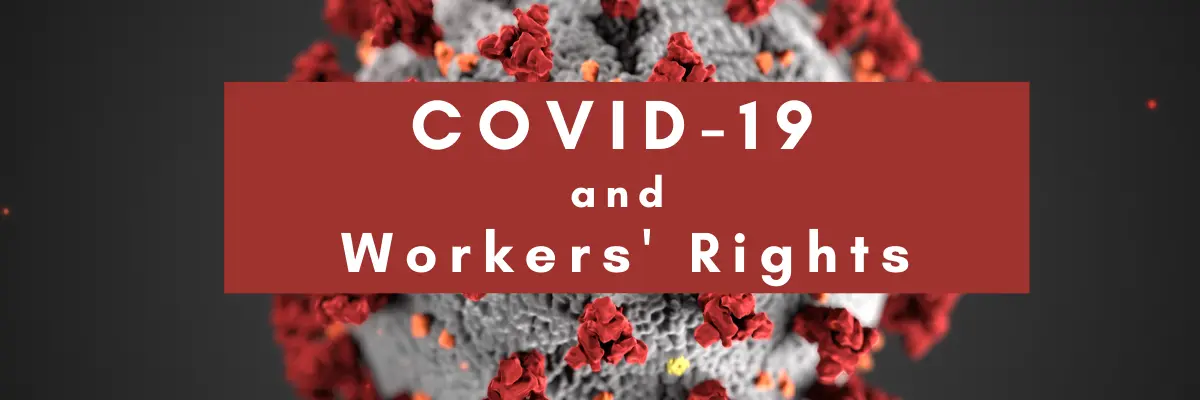
Justice for the Justice-Involved Worker
June 18, 2020
America’s Incarcerated Workers Face A Massive Challenge In The Era Of COVID-19
By Ali Rosenblatt
COVID-19 and Workers’ Rights Series
The COVID-19 and Workers’ Rights series will publish essays from current and incoming students at some of the top law schools in the country. These essays, submitted for the Charles E. Joseph Employment Law Scholarship, look at the pandemic from the perspective of workers’ rights.
Coronavirus has laid bare the vast inequality in the United States, specifically the inequities in the workforce. One section in the workforce bears particular attention, justice-involved individuals. There are unique challenges in the short term, indicative of one of the biggest challenges in the long term.
As COVID-19 rapidly spreads through correctional facilities, the workforce that lives there has little protection. While prisoners can be tasked with manufacturing necessary sanitary products like hand-sanitizer, they cannot use it because it is viewed as contraband.
We have seen this before. Prisoners may be tapped to respond to disasters like the wildfires ravaged California in 2018, where inmates were on the front lines fighting them. However, they are not always evacuated when emergencies threaten their lives. This is the contradictory nature of the prison workforce – they do vital work to ensure public safety as they have their rights stripped from them for the sake of public safety, workers’ rights included.
With such little oversight of this workforce, they lose the worker protection we have become accustomed to in this country. Furthermore, prisoners essentially work for slave wages; they receive $0.14 to $0.63 an hour, on average, for regular jobs and $0.33 to $1.41 an hour for correctional industries.
Part of the reason prisons can get away with this is because workforce and vocational training is supposed to help those incarcerated have a better chance when they are released and upon reentry. This, of course, is a farce. Despite the real-world training and experience individuals receive in prisons, many have a limited chance at getting a job because they will have the mark of “formerly incarcerated.”
There is a barrier for specific jobs, such as fire fighting – even if an individual has experience doing that in prison. Then there is the widespread obstacle presented in applications wherein questions about criminal records can lead to discrimination in hiring returning citizens. A movement to “ban the box,” meaning to remove the question about criminal history from preliminary application forms, has had some success in thirteen states so far.
As a legislative assistant focused on criminal justice reform, I had the opportunity to work with coalition partners to secure federal legislation to this end in the most recent National Defense Authorization Act. Although a step in the right direction, these steps are not enough to prevent discrimination in hiring nationwide and the consequent sky-high unemployment numbers.
Now with the pandemic, and the subsequent downfall, we are witnessing another means of prejudice. In response to the economic predicament, Congress has allocated money to support small businesses through loans and payroll protection. However, if you have been formerly incarcerated, you cannot access these much-needed benefits. The lifeline that our elected officials have deemed is so crucial for small business owners at the moment is out of reach for a people who have businesses of their own after serving their time.
Workers of all stripes are facing challenges right now, whether they are essential or not, whether they are laid off or furloughed, or otherwise. All workers issues are pressing, and the concerns of the justice-involved population is uniquely urgent. While in prison, workers’ health, safety, and rights are disregarded. After prison, they cannot find work. This is the workers’ fight of our time. Everybody deserves the right to work, the right to be protected and maintain their dignity while at work.
Reflections from Charles Joseph
Employment laws protect employees from workplace discrimination, sexual harassment, and wage theft. But these protections do not extend to America’s prison labor force. As Ali Rosenblatt argues, prisoners face some of the worst working conditions in the country with few protections. And COVID-19 will only heighten the dangerous and exploitative conditions for prisoners. Without stronger protections, currently and formerly incarcerated individuals will continue to suffer.
Ali Rosenblatt earned a bachelor’s degree in political science and sociology at the University of Michigan, Ann Arbor. She works as a Legislative Assistant Fellow with the Religious Action Center of Reform Judaism and plans to attend Duke Law School in fall 2020. Contact Rosenblatt on LinkedIn.
Charles Joseph has over two decades of experience as an NYC employment lawyer. He is the founder of Working Now and Then and the founding partner of Joseph and Kirschenbaum, a firm that has recovered over $140 million for clients.